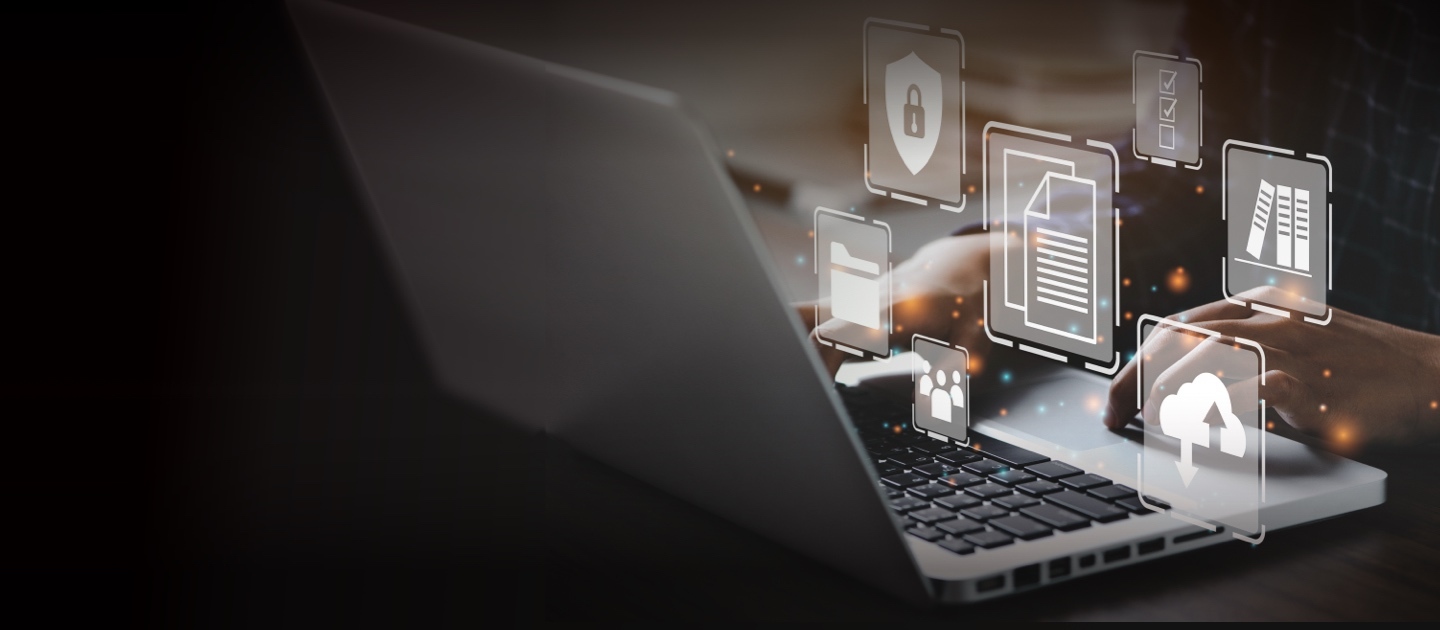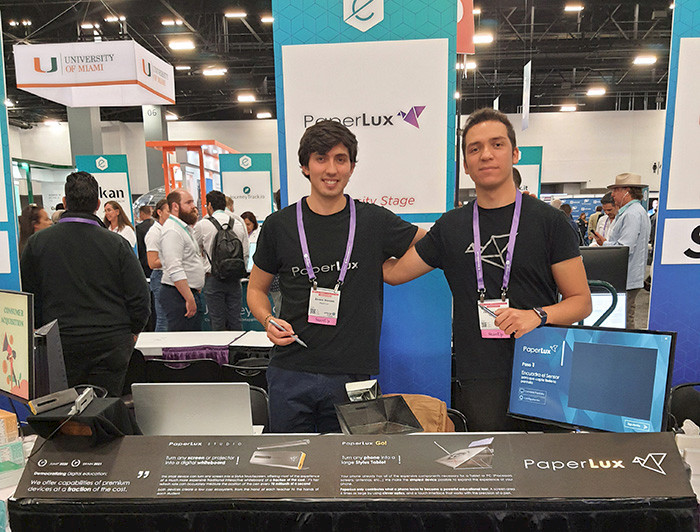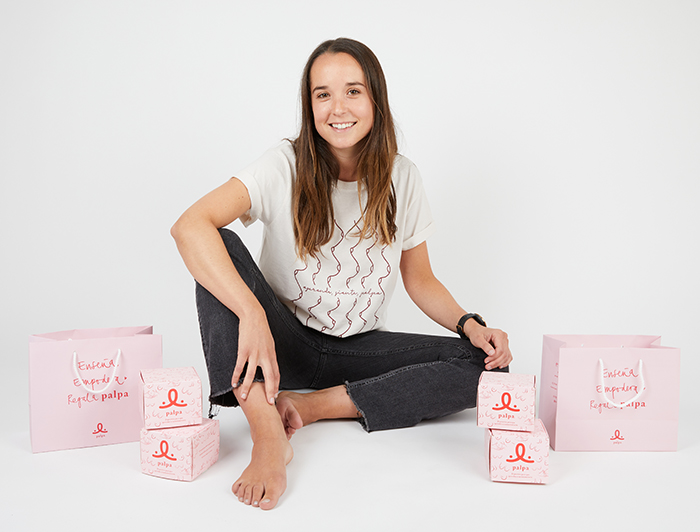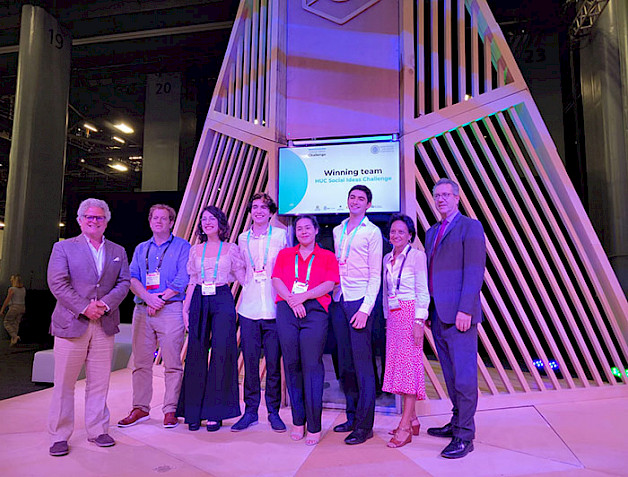
3 Awesome Innovations Developed by UC Students
PaperLux is a low-cost optical device that transforms screens into interactive whiteboards, making it a great solution for education. Palpa is a shower sponge women can use to practice breast self-examination, and Reflush is a technology to reuse and filter gray water to combat the drought.

photo_camera The PaperLux team had a stand at the 2022 eMerge Americas Expo, one of the most important fairs in the region.
When Luciano Lizana and Álvaro Donoso graduated from Liceo Nacional de Maipú, they never imagined that the twists and turns of life would bring them back together again.
Luciano, who was studying at the UC Chile School of Architecture, was looking for someone with knowledge of programming and electrical circuits to help him develop a technology that would facilitate learning in the classroom.
A friend suggested he get in touch with his former schoolmate, who was studying Civil Electrical Engineering at UC Chile.
A few weeks ago, they both presented their startup at the 2022 eMerge Americas Expo in Miami.
Their device is called PaperLux Studio and transforms any screen—such as a home TV or computer—into a touch screen with a pen. The technology is amazingly simple and works by means of a sensor that is connected via a USB port.
At only 79,000 pesos (about US$ 93), the pen has a competitive price compared to the nearly 2.5 million pesos that similar technologies can cost in the market.
"Our main focus is how we can democratize access to digital tools in schools," stated Luciano Lizana.
Aware of the high-tech gaps in Chilean schools, the pair decided to study how they could create simple yet ingenious tools that could be equally powerful.
"We set out to be as low tech and old-school as possible, but able to build a device that works effectively with few basic components. In short, offering a lot for very little," added Álvaro Donoso.
Initially, Luciano Lizana created PaperLux Go, another device that can transform any cell phone into a tablet by means of optics at a cost of around 20,000 pesos (US$24).
He started developing this idea at a bootcamp of the UC Chile certificate of innovation course, which was taught by professors Sebastián Negrete and Paula Wuth.
Subsequently, they won the UC Chile Innovation Center’s Jump Chile competition, which seeks to promote entrepreneurship among higher education students.
More recently, the students were able to exhibit their work at the premier tech event eMerge America, through the Hemispheric University Consortium (HUC) network, a collaborative effort that includes the UC along with 13 other universities from the continent.
Today, their short-term plan is to develop at least 30 units of the PaperLux Studio device and have teachers try it out to hopefully manufacture 600 units by the end of the year.
Continuous improvement has served as way to upgrade the device, which is now in its 14th iteration.
A key aspect of the startup has been interdisciplinary work. “The approach we take with problems is quite different. Álvaro is in charge of the programming and electronics, and I do 3D modeling, design and hardware work," explained Luciano.
"We are constantly giving each other feedback on how to make a better product, which makes it a continuous process," added Álvaro.
Empowering Women

Josefa Cortés, a student at the UC Chile School of Design, was inspired to change her thesis project because of what happened to one of her relatives.
"She felt something in her breast, but thought it was normal. A year later, she went to see the doctor for something else, and she found out she had stage IV breast cancer,” recalls Josefa.
This led Josefa to study the subject, and she discovered that about 30% of women who suffer from breast cancer in Chile are under the age of 40.
This reality prompted her to design Palpa, a breast-shaped device made of a soft and flexible plastic material, similar to silicone, that can be filled with soap for use in the shower and has a lump inside that mimic the hardness and size of a tumor.
Surgeons and oncologists participated in the development process, which involved several stages of testing.
"Ultimately, women learn how to feel and self-examine using Palpa. It is a domestic product. As I am palpating, the soap comes out, and I can soap myself and then self-exam."
During her research, and after several interviews with women, Josefa found that most women feel comfortable self-examining in the shower.
As of today, 25,000 Chilean women have purchased the product, which can be found in Salco Brand Pharmacies at a price of 9,900 pesos (about 12 US dollars).
She is also currently thinking of exporting the device to other countries, which is why its participation in the eMerge Americas expo was so important.
Palpa has a team of five people and investors interested in promoting the initiative beyond Chile.
"I am really pleased that we created something that goes beyond the product itself. We are supporting a cultural change in women, and getting 20-year-old women to start self-examine using Palpa is our greatest success."
A Solution for Water Scarcity

"Reflush" is a technology that allows the reuse and filtration of gray water from kitchen or bathroom sinks.
The device was developed by Maximiliano Frey, Itzae Flores, José Godoy and Paola Olguína, students from the UC School of Engineering. They were inspired by the difficulties faced by communities in the Maule region of central Chile.
As Chile enters its 13th year record-breaking drought, the scenario is increasingly critical for people making a living from agriculture and livestock activities.
The social impact startup recently won the Social Ideas Challenge, a contest promoted by the HUC Network, whose final was in Miami.
Through a system of communicating vessels and physical compression levers, "Reflush" does not rely on the use of electricity, making it an extremely efficient and economical technology.
"We saw that many families were suffering from water scarcity and were using various artisanal ways to get the most out of the water. It was then that we came up with the idea of designing a system that would allow them to efficiently reuse water," said Maximiliano Frey, a UC student and one of the project's leaders.
After winning the Social Ideas Challenge contest, several media outlets were interested in the innovation developed by the UC Engineering team.
The technology employed by "Reflush" could also become a solution for other countries in the region, which are also, like Chile, experiencing the adverse effects of climate change and drought.
For the UC Chile Office of the Vice President for International Affairs (VRAI, as per its Spanish acronym), it is especially important to emphasize how relevant it is for the university to develop this type of project, which not only contributes to society, but also promotes the training of students.
“Presenting innovation and entrepreneurship projects before international audiences is an opportunity to test new limits for students, discovering their own skills and potential. Out in the world, they are UC Chile ambassadors, which opens the way for other students who want to explore and internationalize their experience,” said executive director Ana María Sepúlveda.
“VRAI wants to create opportunities and accompany students in their formative process so that they can become agents of change for global development.”
Meanwhile, the executive director of the HUC international alliance, Gabriela Gerón, emphasized the importance of networking among universities.
As a result of the strategic alliance between HUC and eMerge Americas, initiatives such as the ones mentioned above are expected to take part in events such as the StartUp Showcase.
Here they can participate in the categories of university development, early development and advanced development. Startups can also make their projects known to investors and potential partners, who can support them in increasing the impact of these ventures.


